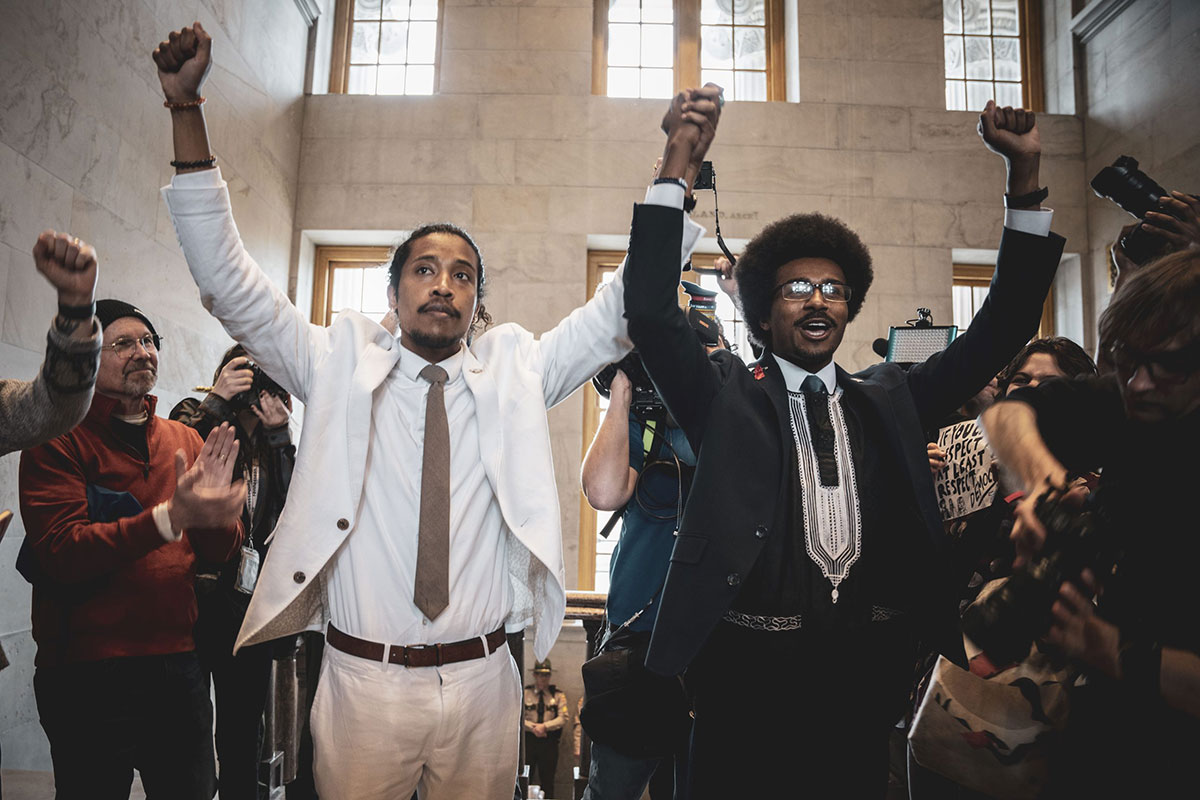This story was originally published by MLK50: Justice Through Journalism. Subscribe to their newsletter here.
Editor’s Note: Rep. Justin Jones, one of the two Black Democrats expelled last week from the GOP-led Tennessee House, was reinstated Monday, April 10, 2023, after Nashville’s governing council voted to reappoint him back to the Legislature. The Nashville Metropolitan Council voted unanimously to restore Rep. Justin Jones to office four days after Republicans stripped him of his seat. Local elected bodies could return both expelled Black state representatives to office, where they and gun reform advocates will continue to speak up.
Perhaps it was a coincidence that the expulsions—that a call for gun control prompted—came just two days after the 55th anniversary of the assassination of Dr. Martin Luther King Jr. A master of civil disobedience, King knew a thing or two about what it means to speak out on behalf of those marginalized.
“There comes a time when one must take the position that is neither safe nor politic nor popular, but he must do it because conscience tells him it is right,” King said in a 1968 speech.
As I listened Thursday to House Republicans berate and denigrate The Tennessee Three, I heard the familiar echoes of a not-so-distant time of legalized disenfranchisement.
In another state, the vengeful rhetoric and racist tirades from elected officials might be cause for censure. But not in Tennessee, not in this toxic political climate, not from these white, far-right, Republican male legislators, not when Democrats are the target.
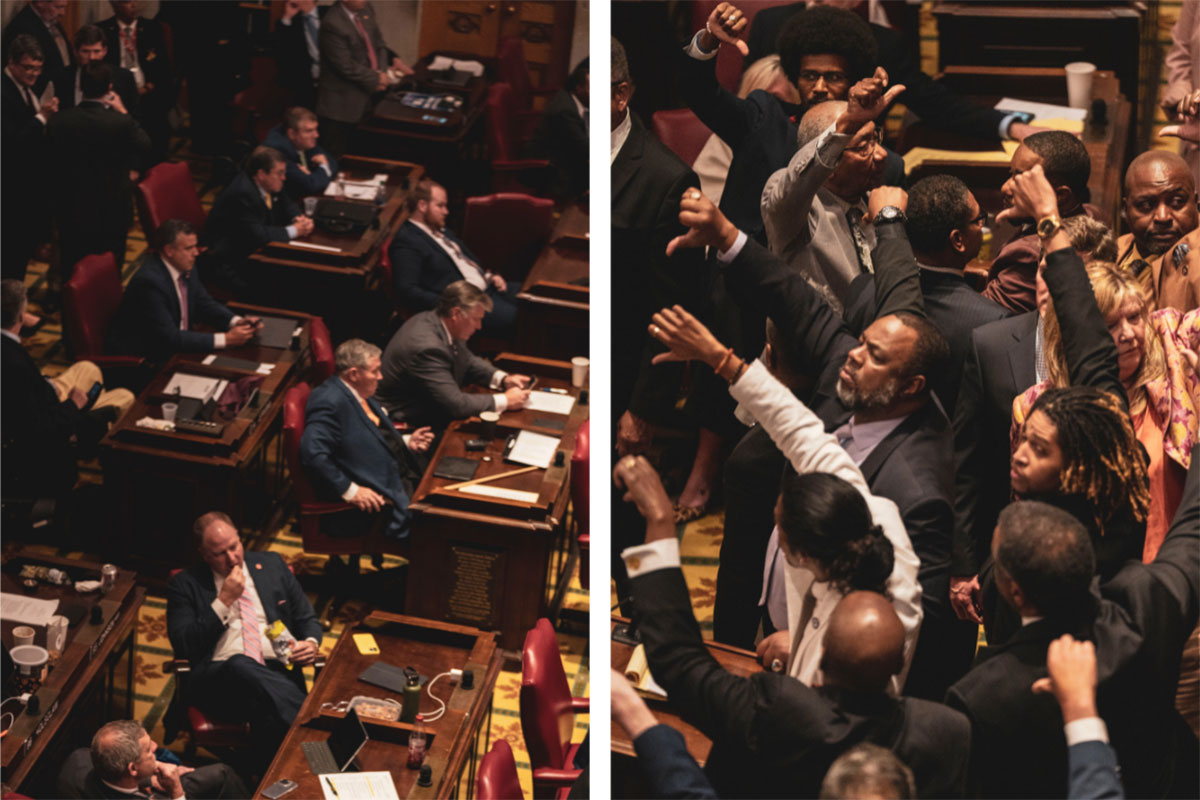
First in their crosshairs was activist and Nashville state Rep. Justin Jones, who is of Black and Filipino descent, expelled not quite five months after taking office. Spared was state Rep. Gloria Johnson of Knoxville, a white woman, elected in November.
And then, the Republican-dominated House gleefully took aim at Memphis’ state Rep. Justin J. Pearson, elected in January. On the first day of his elected job, he arrived in a dashiki. The mere presence of a West African shirt put hypersensitive conservatives’ undergarments in a twist and drew a rebuke from Republican state Rep. David Hawk of Greene County, whose district is 2.6% Black.
The Tennessee Three’s offense: Briefly disrupting a legislative session to call for an end to gun violence, days after the Covenant School shooting massacre that left three 9-year-olds and three adult staff members dead. And for this violation of decorum, Republicans insisted, must be punished.
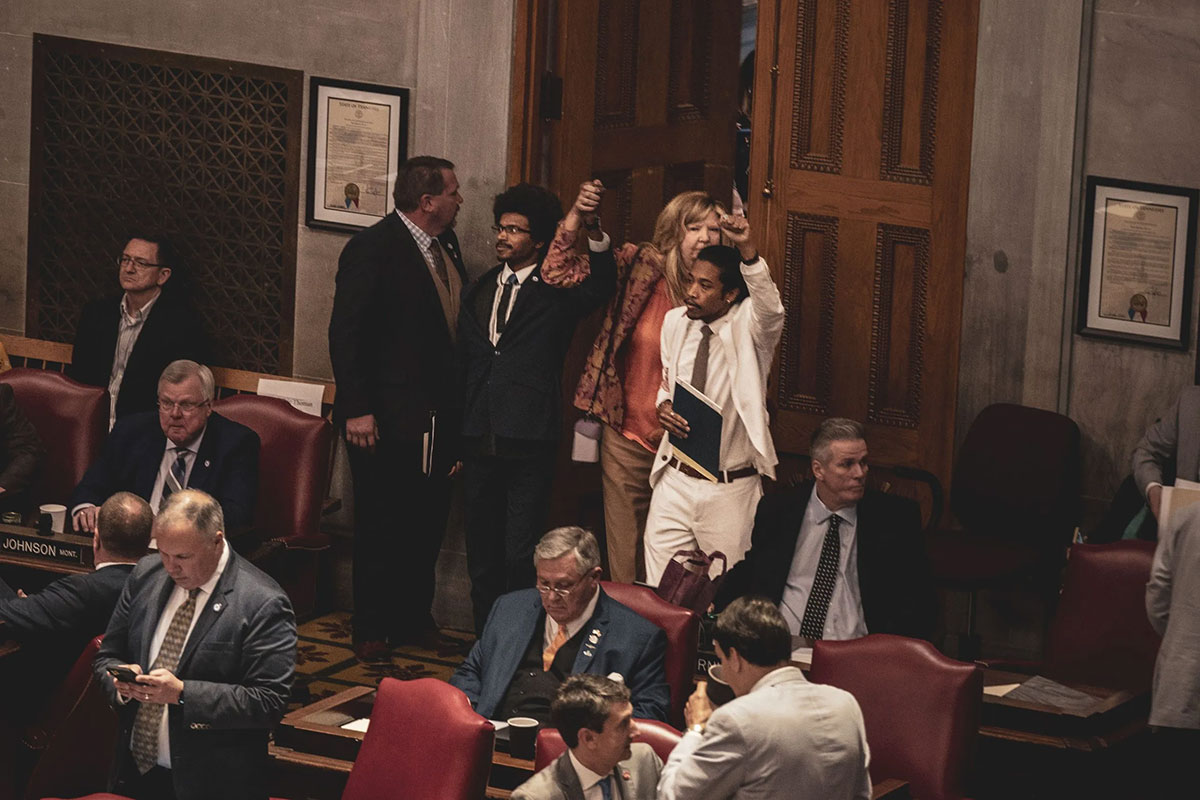
Rep. Andrew Farmer, an East Tennessee Republican whose district is 1% Black, introduced Pearson’s expulsion resolution.
- Some key moments:
- Rep. Andrew Farmer’s derisive remarks to Rep. Justin J. Pearson, accusing him of a throwing “tantrum”
- Rep. Justin J. Pearson’s opening comments
- Reactions to the surprise defeat of the resolution Rep. Gloria Johnson’s expulsion
- Rep. Justin Jones answers the question: What does “No Justice, No Peace” mean
Wagging his finger, Farmer chastised Pearson, a grown man, as if he were a child, as if his subservience was part of his oath of office.
“You don’t understand,” Farmer said. “You don’t truly understand why you’re standing there today.”
“Just because you don’t get your way, you can’t come to the well, bring your friends and throw a temper tantrum with the adolescent bullhorn,” Farmer said.
“You know good and well that we’ve worked hard, we’ve worked very hard to protect our children here in the state of Tennessee,” he continued, as someone in the gallery rightly laughed.
“What you could do, you maybe could file a piece of legislation that maybe would do that instead of sitting back and criticizing folks that’s worked really hard for the past decade. … That might be a place to start, but certainly don’t start by commandeering the well while we’re conducting business here in this Tennessee general assembly.
“That’s why you’re standing there, because of that temper tantrum that day, for that yearning to have attention.
“That’s what you wanted. Well, you’re getting it now.”

Those who’ve been on the receiving end of white supremacy recognize Farmer’s tone. It’s the energy of a white man galled by the perceived impudence of a Black man. It’s the steely, spiteful resolve to put him in his place, a place that is always below, behind, beneath. It’s not hard to imagine that in a less formal setting, where there were no cameras, Farmer would have called Pearson a boy, or worse.
To quell dissent on plantations, slavers would murder enslaved people who got out of line. White supremacists did the same to Black people with the temerity to vote. As recently as last year, Shelby County Republican district attorney, who lost her re-election bid, wrongly persecuted a Black would-be woman voter, landing outspoken activist Pamela Moses in jail before dropping the charges.
The goal is always the same: Make an example of those who speak up. Let them serve as a warning to others who might do the same. The message: We will squash any effort to dismantle the status quo.
Republicans have a supermajority in the House, the Senate and control the governor’s office. With that absolute power, they hold the state in a death grip. That’s not hyperbole: Their far-right policies—including their refusal to expand Medicaid, allowing permitless concealed carry, banning gender affirming care for children and enacting a virtually no exceptions abortion ban—have fatal consequences.
As does their refusal to do something, anything about gun violence. Even when the bodies of little white children in a faith-based school are ripped apart by a military-grade weapon so powerful it gives police officers pause, a firearm that should never be in civilian hands.
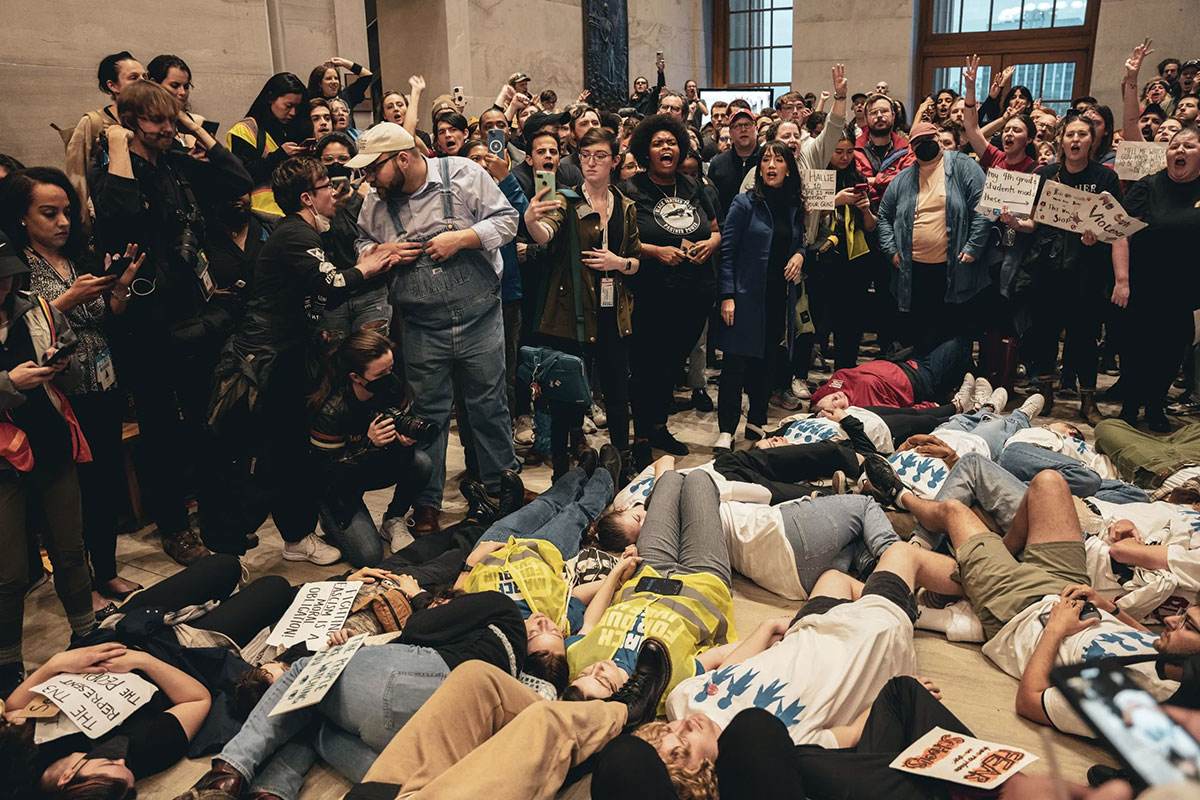
Republicans’ absolute power has corrupted them absolutely; Farmer’s snide advice that Pearson should have shut up and simply focused on passing legislation ignores the fact that Republicans have silenced Democratic legislators at every turn, turning off their mics, refusing to acknowledge them, shutting off any attempts to debate or even discuss. They make a mockery of democracy.
Pearson’s rebuttal Thursday was as fiery as Farmer and other Republicans were disrespectful. Pearson’s, Johnson’s and Jones’ brief display of solidarity with anti-gun violence protesters outside did no harm, except to feelings. They took no lives, unlike Republicans’ inaction every day. The GOP could have chosen to ignore this First Amendment protected expression, to let it pass in the swell of outrage following the school shooting.
But they did not. They could not.
Instead, they harped on “decorum” while displaying none. Pearson noted the irony of the sham proceedings “in a country that was built on a protest,” but it was for naught.
Perhaps it’s no coincidence that the expulsions came the day before Christians celebrate Good Friday, the day Jesus was killed by the government, and just three days before Easter.
“It got quiet on Saturday,” Pearson said from the House floor Thursday, acknowledging the timing. “All hope seemed to be lost. … We have good news, folks. Sunday always comes. Resurrection is a promise and it is a prophecy.”
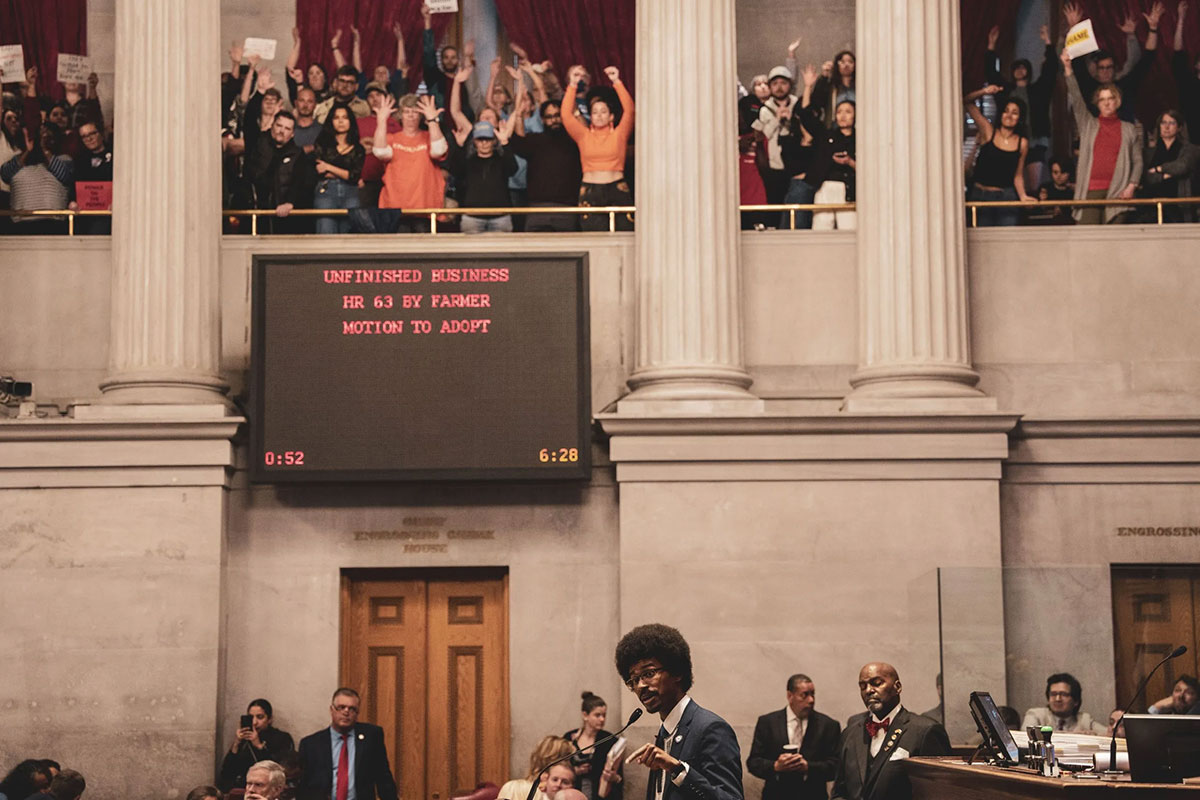
Tennessee, the state I’ve called home for more than half my life, makes me sad and sometimes, despondent. The disappointment comes more and more often these days.
But then I listen not to the legislators, but the chants from the hundreds, maybe thousands of young people and demonstrators and activists and students and mothers who flooded the Capitol in recent days, the hundreds of students who walked out of school to demand an end to gun violence.
From their hope, their willingness to put their bodies on the line, from their righteous rage, I draw hope.
We’d do well to remember the words attributed to Rev. William Barber of the Poor People’s Campaign, a civil disobedience practitioner and a civil rights champion of our time: “You know how powerful you are by how hard they try to fight you.”
Reps. Justin J. Pearson and Justin Jones will be back—possibly as state representatives again, but undoubtedly as activists and agitators. Their cause—protecting children from gun violence—is too important, the moment too urgent, the demands of the people too loud.
MLK50: Justice Through Journalism is a nonprofit newsroom focused on poverty, power and policy in Memphis. Make a tax-deductible donation today and support independent journalism. These generous donors also support MLK50.
This MFP Voices essay does not necessarily represent the views of the Mississippi Journalism and Education Group, the Mississippi Free Press, its staff or board members. To submit an opinion for the MFP Voices section, send up to 1,200 words and sources fact-checking the included information to azia@mississippifreepress.org. We welcome a wide variety of viewpoints.

